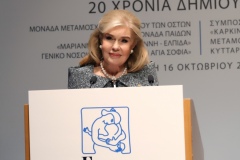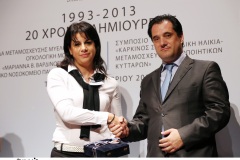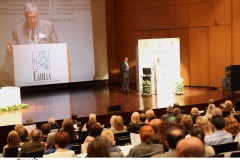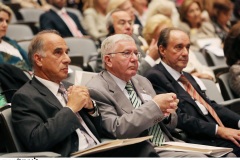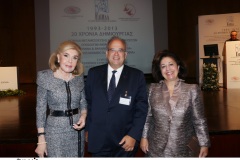The new impressive data concerning the battle waged every day at the side of children with cancer and the significant progress that has been made in recent years in the field of Hematopoietic Stem Cell Transplantation were presented by distinguished Greek and foreign clinicians and medical researchers at the medical symposium on Childhood Cancer – Hematopoietic Stem Cell Transplantation which was held at the Athens Concert Hall on Wednesday 16 October 2013.
The Symposium was organized by the ELPIDA Association of Friends of Children with Cancer in collaboration with the Hellenic Society for Hematology, on the occasion of the 20th anniversary of the Pediatric Bone Marrow Transplant Unit which was established by the ELPIDA Association in 1993 at the Aghia Sophia Children’s Hospital.
The Symposium was opened by the President of ELPIDA, Mrs. Marianna V. Vardinoyannis: “We are delighted to welcome you to the medical symposium organized by ELPIDA on the occasion of the 20th anniversary of the Bone Marrow Transplant Unit. We have invited you to be here with you as we always have when our work has reached a landmark point in its course. These are times that we wish to share with the medical community, the doctors, the nurses, the researchers, the people who have dedicated their life to the battle against cancer. And we would like to offer you a forum from which to send your own hope-filled message to society that cancer can be defeated… Twenty-three years ago, ELPIDA was embarking on its long journey. Today, we find ourselves at the heart of that journey, having to our credit not only the Unit, but also the Hospital, which receives 80% of Greece’s childhood cancer cases, as well as cases from neighboring countries. Out of these cases, 3 to 4 children return home completely cured. Thanks to our Oncological hospital, Greece’s children belong to the 20% of the world’s children who have access to improved medical care to treat their cancer. We also have our Guest House that offers the children’s families a second home for as long as the children’s treatment lasts, as well invaluable psychological support. Standing before the future, we feel optimistic and strong, drawing strength from Elpida’s children and maintaining zero tolerance towards any kind of half-measure when it comes to a child’s life. For this reason, we will not stop here. We will take new steps that will complement what we already offer children with cancer and their families. Very soon, the Volunteer Bone Marrow Donor Bank, which we have named ‘Vision of ELPIDA [hope],” will be inaugurated. The bank will be housed in the Hospital and will become the means by which donors will be found faster and at less expense for children that need transplants. At the same time, we are moving to found a National Transplant Center. It will be the first one in Greece for children, for the transplant of solid organs. This will fill a huge gap in health care, in an area that is of great importance to many Greek families. Our third plan involves the creation of an excellence Center for specialized research on treatments of cancer. In all of these endeavors, we need you by our side…”
During her address, Mrs. Vardinoyannis thanked all the speakers for taking part in the symposium, and especially professors David Khayat from France, Giuseppe Masera from Italy and Νamik Yaşar Özbek from Τurkey, who, despite their busy schedules, traveled to Athens in order to take part in ELPIDA’s Symposium and Anniversary evening. Mrs. Vardinoyannis also congratulated the symposium’s organizational and scientific committee: Mr. Constantinos Tsatalas, Professor of Hematology at the Democritus University of Thrace and President of the Hellenic Society for Hematology; Mrs. Ekaterini Metaxotou, Professor Emeritus of Genetics and Pediatrics at Athens University and a member of ELPIDA’s Board of Directors; And Mr. Stelios Grafakos, Director of the Bone Marrow Transplant Unit.She also thankedthe journalist Mr. Michalis Kefaloyannis, who moderated the symposium’s opening.
The Symposium was addressed by Mr. Adonis Georgiadis, Minister of Health; Princess Ekaterini of Serbia and President of the Lifeline Foundation; Mr. Alkiviadis Kostakis, Professor Emeritus of the University of Athens and President of the National Transplant Organization; Mr. Constantinos Tsatalas, Professor of Hematology and President of the Hellenic Society for Hematology; Mr. Giuseppe Masera, Professor of Pediatrics; Mr. Emmanuel Papasavvas, Director the Aghia Sophia Children’s Hospital; and Mr. Stelios Grafakos, Associate Professor of Medicine at the University of Athens, Pediatrician and Hematologist.
The addresses were followed by the presentation of an award to Mrs. Ekaterini Boukla, founder of the “Rodavgi” society of volunteer bone marrow donors on the island of Rhodes. The award was presented by the Minister of Health, who congratulated Mrs. Boukla for the battle she is waging.
The Symposium then began. Topics developed related to the 20-year-long activities of the Pediatric Transplant Unit; the achievements and expectations in the field of hemopoietic stem cell transplant; and the importance of volunteer bone marrow donors. More specifically, the symposium attendees exchanged opinions and experiences on subjects such as, the suitability/provenance of potential donors and transplant material; the increase in the number of transplants involving donors who are not related to the patient and who are located in the international volunteer donor and stem cell blood banks; the importance of the operation of the Volunteer Donor Bank; the special procedure of drawing hemopoietic cells from an underage sibling/donor; The offer of transplant material from an unrelated volunteer donor, etc.
The good news in the field of Hemopoietic Stem Cell Transplantation (HSCT), as was underscored during the Symposium, is the significant progress that has been made and which, as the leading scientists participating in the Symposium explained, is due to the new methods and techniques being applied, to the improved support of patients, as well as to the increase in bone marrow donors. A contributing factor to this is the significant increase in volunteer bone marrow donors internationally. Indeed, the worldwide number of registered volunteer bone marrow donors exceeds 22 million. Given that the chances of a compatible related (mainly a sibling) donor being found is 30%, most transplants nowadays involve volunteer donors who are unrelated to the patients. Thanks then to these sensitized people, the volunteer bone marrow donors, many more people can be saved through HSCT.
It was also emphasized that:
- Umbilical cord blood is a valuable source of hemopoietic cells which can be used alternatively with very good results.
- Even when there is no compatible donor, whether related or unrelated, the methods that have been developed allow a transplantation from a relative (usually a parent), who is incompatible, a solution which was not feasible in the past.
- The results of these transplants, which are potentially high risk, have been satisfactory and so today any patient needing a hemopoietic stem cell transplant is able to have one and thus keep hope alive.
The audience was also impressed by the presentation of the Pediatric Bone Marrow Transplantation Unit’s activity during its twenty-year-long operation and, through it, the extent of the contribution made by ELPIDA.
- The Unit is the only such pediatric unit in Greece and first operated at the Aghia Sophia Children’s Hospital. Since 2010, it has been housed at the Marianna V. Vardinoyannis – ELPIDA Children’s Oncological Unit.
- The Unit has 18 beds.
- It carries out approximately 60 transplants annually.
- Since 1993 to this day, the Unit has carried out 670 transplants on children who have been diagnosed with especially serious, life-threatening illnesses, such as leukemia, aplastic anemia, lymphomas, solid childhood tumors, hereditary immunodeficiencies, thalassemia, etc.
- The survival rate of patients for most of these diseases exceeds 70%, while for thalassemia it comes to 95%, a percentage which one of the highest internationally.
- At the Unit, the most contemporary treatment methods are applied and all types of Hemopoietic Cell Transplants take place using related or unrelated donors.
CONCLUSION: Childhood cancer can be defeated!
The new impressive data concerning the battle waged every day at the side of children with cancer and the significant progress that has been made in recent years in the field of Hematopoietic Stem Cell Transplantation were presented by distinguished Greek and foreign clinicians and medical researchers at the medical symposium on Childhood Cancer – Hematopoietic Stem Cell Transplantation which was held at the Athens Concert Hall on Wednesday 16 October 2013.
The Symposium was organized by the ELPIDA Association of Friends of Children with Cancer in collaboration with the Hellenic Society for Hematology, on the occasion of the 20th anniversary of the Pediatric Bone Marrow Transplant Unit which was established by the ELPIDA Association in 1993 at the Aghia Sophia Children’s Hospital.
The Symposium was opened by the President of ELPIDA, Mrs. Marianna V. Vardinoyannis: “We are delighted to welcome you to the medical symposium organized by ELPIDA on the occasion of the 20th anniversary of the Bone Marrow Transplant Unit. We have invited you to be here with you as we always have when our work has reached a landmark point in its course. These are times that we wish to share with the medical community, the doctors, the nurses, the researchers, the people who have dedicated their life to the battle against cancer. And we would like to offer you a forum from which to send your own hope-filled message to society that cancer can be defeated… Twenty-three years ago, ELPIDA was embarking on its long journey. Today, we find ourselves at the heart of that journey, having to our credit not only the Unit, but also the Hospital, which receives 80% of Greece’s childhood cancer cases, as well as cases from neighboring countries. Out of these cases, 3 to 4 children return home completely cured. Thanks to our Oncological hospital, Greece’s children belong to the 20% of the world’s children who have access to improved medical care to treat their cancer. We also have our Guest House that offers the children’s families a second home for as long as the children’s treatment lasts, as well invaluable psychological support. Standing before the future, we feel optimistic and strong, drawing strength from Elpida’s children and maintaining zero tolerance towards any kind of half-measure when it comes to a child’s life. For this reason, we will not stop here. We will take new steps that will complement what we already offer children with cancer and their families. Very soon, the Volunteer Bone Marrow Donor Bank, which we have named ‘Vision of ELPIDA [hope],” will be inaugurated. The bank will be housed in the Hospital and will become the means by which donors will be found faster and at less expense for children that need transplants. At the same time, we are moving to found a National Transplant Center. It will be the first one in Greece for children, for the transplant of solid organs. This will fill a huge gap in health care, in an area that is of great importance to many Greek families. Our third plan involves the creation of an excellence Center for specialized research on treatments of cancer. In all of these endeavors, we need you by our side…”
During her address, Mrs. Vardinoyannis thanked all the speakers for taking part in the symposium, and especially professors David Khayat from France, Giuseppe Masera from Italy and Νamik Yaşar Özbek from Τurkey, who, despite their busy schedules, traveled to Athens in order to take part in ELPIDA’s Symposium and Anniversary evening. Mrs. Vardinoyannis also congratulated the symposium’s organizational and scientific committee: Mr. Constantinos Tsatalas, Professor of Hematology at the Democritus University of Thrace and President of the Hellenic Society for Hematology; Mrs. Ekaterini Metaxotou, Professor Emeritus of Genetics and Pediatrics at Athens University and a member of ELPIDA’s Board of Directors; And Mr. Stelios Grafakos, Director of the Bone Marrow Transplant Unit.She also thankedthe journalist Mr. Michalis Kefaloyannis, who moderated the symposium’s opening.
The Symposium was addressed by Mr. Adonis Georgiadis, Minister of Health; Princess Ekaterini of Serbia and President of the Lifeline Foundation; Mr. Alkiviadis Kostakis, Professor Emeritus of the University of Athens and President of the National Transplant Organization; Mr. Constantinos Tsatalas, Professor of Hematology and President of the Hellenic Society for Hematology; Mr. Giuseppe Masera, Professor of Pediatrics; Mr. Emmanuel Papasavvas, Director the Aghia Sophia Children’s Hospital; and Mr. Stelios Grafakos, Associate Professor of Medicine at the University of Athens, Pediatrician and Hematologist.
The addresses were followed by the presentation of an award to Mrs. Ekaterini Boukla, founder of the “Rodavgi” society of volunteer bone marrow donors on the island of Rhodes. The award was presented by the Minister of Health, who congratulated Mrs. Boukla for the battle she is waging.
The Symposium then began. Topics developed related to the 20-year-long activities of the Pediatric Transplant Unit; the achievements and expectations in the field of hemopoietic stem cell transplant; and the importance of volunteer bone marrow donors. More specifically, the symposium attendees exchanged opinions and experiences on subjects such as, the suitability/provenance of potential donors and transplant material; the increase in the number of transplants involving donors who are not related to the patient and who are located in the international volunteer donor and stem cell blood banks; the importance of the operation of the Volunteer Donor Bank; the special procedure of drawing hemopoietic cells from an underage sibling/donor; The offer of transplant material from an unrelated volunteer donor, etc.
The good news in the field of Hemopoietic Stem Cell Transplantation (HSCT), as was underscored during the Symposium, is the significant progress that has been made and which, as the leading scientists participating in the Symposium explained, is due to the new methods and techniques being applied, to the improved support of patients, as well as to the increase in bone marrow donors. A contributing factor to this is the significant increase in volunteer bone marrow donors internationally. Indeed, the worldwide number of registered volunteer bone marrow donors exceeds 22 million. Given that the chances of a compatible related (mainly a sibling) donor being found is 30%, most transplants nowadays involve volunteer donors who are unrelated to the patients. Thanks then to these sensitized people, the volunteer bone marrow donors, many more people can be saved through HSCT.
It was also emphasized that:
- Umbilical cord blood is a valuable source of hemopoietic cells which can be used alternatively with very good results.
- Even when there is no compatible donor, whether related or unrelated, the methods that have been developed allow a transplantation from a relative (usually a parent), who is incompatible, a solution which was not feasible in the past.
- The results of these transplants, which are potentially high risk, have been satisfactory and so today any patient needing a hemopoietic stem cell transplant is able to have one and thus keep hope alive.
The audience was also impressed by the presentation of the Pediatric Bone Marrow Transplantation Unit’s activity during its twenty-year-long operation and, through it, the extent of the contribution made by ELPIDA.
- The Unit is the only such pediatric unit in Greece and first operated at the Aghia Sophia Children’s Hospital. Since 2010, it has been housed at the Marianna V. Vardinoyannis – ELPIDA Children’s Oncological Unit.
- The Unit has 18 beds.
- It carries out approximately 60 transplants annually.
- Since 1993 to this day, the Unit has carried out 670 transplants on children who have been diagnosed with especially serious, life-threatening illnesses, such as leukemia, aplastic anemia, lymphomas, solid childhood tumors, hereditary immunodeficiencies, thalassemia, etc.
- The survival rate of patients for most of these diseases exceeds 70%, while for thalassemia it comes to 95%, a percentage which one of the highest internationally.
- At the Unit, the most contemporary treatment methods are applied and all types of Hemopoietic Cell Transplants take place using related or unrelated donors.
CONCLUSION: Childhood cancer can be defeated!









